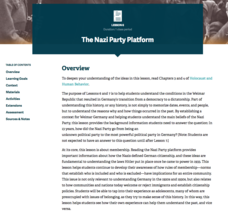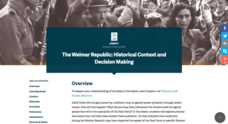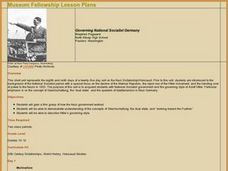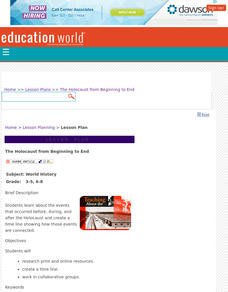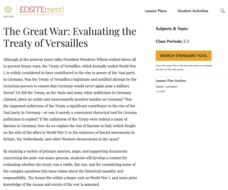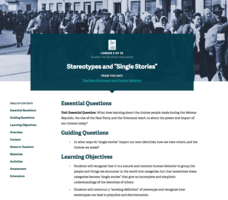Facing History and Ourselves
The Nazi Party Platform
Not all party platforms stay democratic. A resource covers many political issues in Germany during the time of World War II, and teaches pupils about the Nazi party platform and what went wrong. Individuals participate in a warm-up...
Facing History and Ourselves
The Weimar Republic: Historical Context and Decision Making
Did you know that way before Hitler became a dictator, he actually spent nine months in a German jail? Provide the background for the escalating point before the Nazi party took over in World War II through the exercises in the resource....
Curated OER
World War II Begins
Studying World War II? Explore the major incidents and factors leading to America entering the war with this history PowerPoint. Topics are broken into easy to follow points and cover content such as, the Depression, Nazi Party, Hitler,...
Facing History and Ourselves
Us and Them: Confronting Labels and Lies
Stereotyping and discrimination based on religion catalyze many atrocities in the world. Explain the awful treatment of Jews and the lies Nazis spread by using an informative yet sensitive resource. Learners participate in a warm-up and...
Facing History and Ourselves
The Nazis in Power: Propaganda and Conformity
The Nazis used the power of propaganda to encourage confirmative views and the discrimination of Jews. A social studies resource illustrates these issues through discussion, image analysis, and a writing exercise.
Curated OER
Governing National Socialist Germany
Young scholars spend a month discovering the role of the Nazi Dictatorship during the Holocaust. Using the internet, they research the history of the Nazi party and the decline of the Weimar Republic. They examine how Hitler rose to...
Curated OER
The Reichstag Fire
Students examine the implications of the burning of the Reichstag in 1933. Using the Weimer Constitution as a guide, they identify issues that allowed for Hitler and the Nazi party to gain power. In groups, they create a web of the...
Facing History and Ourselves
Life for German Youth in the 1930s: Education, Propaganda, Conformity, and Obedience
The German youth faced an onslaught of propaganda when they went to school, thanks to the Nazi regime led by Hitler during World War II. Pupils relate their education experiences to German youth by analyzing primary source readings,...
Curated OER
Prejudice Discussion
Students discuss ethical dilemmas in a cooperative setting, and compare today's social problems with those present during the rise of the Nazi party.
Facing History and Ourselves
Do You Take the Oath?
Why did so many go along with Nazi policies during World War II? An investigatory unit includes four handouts, reading analyses, classroom discussion topics, and intriguing philosophical questions, helping learners understand the...
Curated OER
Nazism
Tenth graders explore the acts of the Nazi party and discuss how people can commit atrocities against humanity. They discuss the aspects of the Aryan race that the Nazis identified with and how they led them to think they should purify...
Curated OER
The Rise of Hitler
Eleventh graders investigate how Hitler was able to harness Germany. In this World War II lesson, 11th graders conduct primary and secondary source research to determine how Hitler used the Great Depression, charisma, scapegoats, and the...
Curated OER
The Holocaust: An Introduction for Children (To Be Used with Number the Stars)
In this literature and history worksheet, students prepare to read the novel by Lois Lowry Number the Stars. Students read the history behind the Nazi occupation of Denmark and the arrest of the Jews there. This is a 10 page historical...
Curated OER
The Holocaust from Beginning to End
Students explore the events that occurred before, during, and after the Holocaust and create a time line showing how those events are connected. They create a time line showing the events that occurred before, during, and after the...
Curated OER
The Great War: Evaluating the Treaty of Versailles
Young scholars examine and evaluate the Treaty of Versailles. They read and discuss primary source documents, explore various websites, develop a list of postwar goals for France, Germany, and the U.S., and evaluate whether the treaty...
Facing History and Ourselves
Laws and the National Community
When it comes to the law, is justice always served? Teach scholars about how law sometimes enables prejudice of entire groups of people with a unit on World War II that includes a warm-up activity, analysis of primary sources,...
Facing History and Ourselves
Kristallnacht: Decision-Making in Times of Injustice
Have you ever been singled out in a crowd before? Pupils investigate and analyze the events of the Holocaust. They dive into the life of a middle school student, as well as the diary entries of those in Kristallnacht during World War II.
Facing History and Ourselves
Justice After the Holocaust
Though there could be no true justice for the horrors of the Holocaust, many of those responsible for crimes against humanity were found guilty in the eyes of the law. Using primary and secondary sources in the 16th installment of a...
Facing History and Ourselves
The Holocaust: Bystanders and Upstanders
Scholars analyze the role of bystanders during the Holocaust. The investigation explores the roles of the bystanders, upstanders, and rescuers with primary and secondary resources to determine actions taken—or not—and their implications...
Facing History and Ourselves
Stereotypes and “Single Stories”
Help bring subconscious stereotypes to the surface to stop it in its tracks. Pupils first read an excerpt describing the experience of prejudice and analyze how this process connects to World War II. Then, they write a creative story...
Facing History and Ourselves
How Should We Remember?
We must remember the past in order to avoid its mistakes. Young historians analyze the importance of historical remembrance using primary and secondary documents, as well as video clips. They then study the creation of a World War II...
Curated OER
Life Prior to Kristallnacht (1933-1938)
Students research the way of life of the Jews before Kristallnacht. Using new vocabulary and resources, they discover how carefree life was before the days of discrimination and antisemitism. In groups, they create a timeline of the...
Curated OER
World War II: Concentration Camps and Refugees
Students explore the experiences of the people in the concentration camps at liberation during World War II. Students read an article on the Liberation of Belsen Concentration Camp and D-Day and report to the class.
Curated OER
One Survivor Remembers: Anti-Semitism
Students analyze and discuss how propaganda influenced anti-Semitism and it's role in World War II. In this propaganda lesson plan, students define the terms involved in this assignment. Then they will discuss their reactions to a film...


